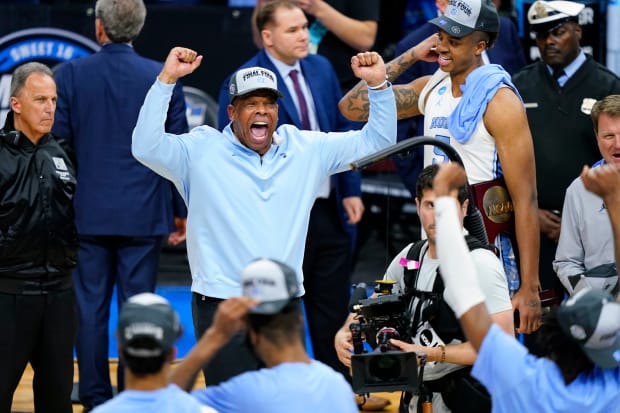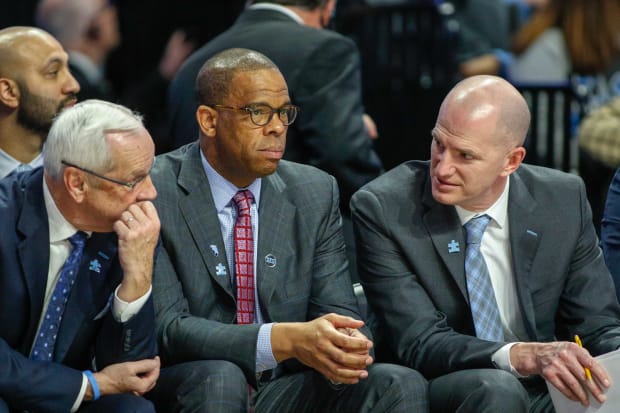After the first question of the postgame press conference, Hubert Davis’s pause lasted a full 15 seconds. Long enough to wonder whether the Zoom connection had frozen. Long enough to wonder whether the North Carolina coach had any answer at all, literally or figuratively.
This was Feb. 16, after Davis’s Tar Heels had been embarrassed at home by a Pittsburgh team that would go on to lose 21 games and finish 13th in the Atlantic Coast Conference. North Carolina trailed by 17 at halftime and by 21 with 10 minutes to play before reducing the final deficit to nine. With a résumé heavy on blowout losses and light on quality wins, Carolina’s NCAA tournament hopes were dwindling and Davis’s critics were roaring.
But the first-year coach tasked with replacing the great Roy Williams wasn’t going to do or say anything that fed the growing maelstrom of discontent. The relentlessly upbeat 51-year-old let the dead air get the message across without giving voice to frustration. Disappointment was expressed, but so was determination.
“You can sit here and whine and complain and point fingers and make excuses and continue to be down on yourself,” Davis said, “or you can show up the next day ready to fight and compete and get after it. That’s what this team and this program will do.”

Matt Rourke/Associated Press
Forty-one days later, Davis sat in the same spot and addressed the media as the coach of a Final Four team that will play its biggest game in the history of the biggest rivalry in college basketball. The Tar Heels have won 10 out of 11 games since that night in mid-February. Among the victories: beating Duke in Mike Krzyzewski’s final home game, eliminating reigning champion Baylor and a UCLA team that returned everyone from the 2021 Final Four, and ousting the Cinderella to end all Cinderellas, Saint Peter’s.
Answering the questions was much easier this time around. Including this one: How did he remain positive amid the negativity that was swirling around his team?
“Why wouldn’t I stay positive?” Davis said Tuesday. “I love these kids, they’re great. What is there to be negative about? They’re kids. My job is to love, support, encourage them. They trusted me. This is my first year as a head coach and they trusted me. My goodness, I love these kids.”
And North Carolina, once again, loves Hubert Davis.
Truth be told, the Carolina faithful have always loved Davis and always will. He was a standout player at the school from 1988-92 under Dean Smith and a loyal assistant to Williams from 2012-21. In between, he was an overachieving 12-year NBA player and distinguished TV analyst on ESPN. He has represented everyone who has ever employed him with class.
But for much of this season, North Carolina fans' love was more conditional than unconditional. They loved former player Hubert Davis. They loved assistant coach Hubert Davis. Head coach Hubert Davis was on the Wait and See List.
By the Pitt debacle in mid-February, many Carolina fans had waited long enough and seen enough to decide Davis wasn’t up to the monumental task of following Williams. They gritted their teeth through early neutral-court losses against Purdue and Tennessee, shook their heads at a blowout loss versus Kentucky in Las Vegas, grumbled through routs at Miami and Wake Forest. When Duke crushed North Carolina in the Dean Dome in early February, the reviews were unsparing.
“That ticked me off quite a bit,” says Williams, who championed Davis’s candidacy to replace him. “I don’t have Instagram or Snapchat or YouTube or whatever, but I heard enough to know that some people weren’t being fair. You know, Tiger Woods shot 40 on the front nine at Augusta on Thursday [in 1997] and won the tournament by a record.
“Two people tried to say something to me [about Davis’s coaching]. I shut them up right away. You say something nice but then it’s, ‘Well, but …’ That’s a coward’s way of insulting him.”
Carolina administrators were displeased with the fan criticism, as well. It’s almost a badge of honor to be ripped by your own fans on Tobacco Road. Dean Smith was hung in effigy on campus early in his North Carolina tenure; Krzyzewski was under fire during his first three years at Duke. But the world moves more quickly now, and some had no interest in giving Davis years to prove himself. They had made up their minds 26 games in.
If Davis was bothered by it, he never showed it. Not in public, and not even in private conversations with his father, Hubert, Sr. “Hubert told me, ‘I played in the NBA for 12 years and worked at ESPN,” his father says. “‘I know what pressure is. This doesn’t bother me, Dad.’”
If Davis had frustrations, they weren’t taken out on the team. Practices didn’t become punishments, film sessions were not degrading. Public criticism had no place within the Carolina facilities. Davis lived out an expression Williams often used, originally an Arabic proverb that also has been attributed to Dr. Joseph Needham, a 20th century British biochemist and science historian: “The dogs bark, but the caravan moves on.”
After the Pitt loss, the caravan made a key stop three days later at Virginia Tech—the Heels won 65–57, the beginning of a gradual move forward. The Heels played improved defense, allowing the Hokies just 0.86 points per possession, a sign of what was to come for a team that spent months struggling to stop anyone.
That was followed by three more functional wins against mediocre opponents heading into the rematch with Duke. Scan the Carolina fan message boards from the days leading up to that game and it was widely viewed as Mission Impossible. Losing was a given, and a blowout was widely expected.
Instead, North Carolina scored its biggest win in the 257-game history of the series. The underdog Tar Heels persevered in a cauldron of noise, fought back from a couple of deficits, and then watched the Blue Devils shockingly wilt in the last five minutes. Cameron was transformed from a pregame festival to a postgame morgue. And Davis was transformed from a coach struggling to gain traction with his fan base to an instant coaching hero.
A few hours away in Burke, Va., Hubert Davis Sr., showed some resolve of his own. He kept the TV on the entire game. There are times during Carolina games, when the Heels are playing poorly, that tension and frustration cause him to click it off. Not on the night of March 5.
Hubert Sr., had been invited by his son to attend the game, but Cameron is low on creature comforts. He would have to stand the entire game and an aching back wasn’t up for that challenge. So he watched in the living room of the house where he and his late wife, Bobbie, raised Hubert and his sister, Keisha. He saw his son’s subtle steel shining through in the Carolina players and was gratified by Krzyzewski’s praise of Hubert and the Heels.
“I watched Coach K’s press conference and I was proud of what he said,” Hubert Sr. says. “Hubert has a competitive nature that I drilled into him coming up. You can have your friends, but when you step on the court between the lines, they’re not your friends anymore. You’re playing to beat them.”

Nell Redmond/USA Today Sports
The landmark victory guaranteed Carolina’s spot in the NCAA tournament. Hubert Sr. wasn’t going to travel all the way to Fort Worth for the first two games, so he watched those from his living room, as well. Somehow, he kept the TV on during the entire Baylor soap opera, in which the Heels blew a 25-point lead in the final 10 minutes of regulation (with some help from a very shaky officiating crew). Hubert Sr. was ready to click it off the second Baylor took a lead in overtime, but that moment never came. North Carolina regrouped and won, its second massive upset victory in two weeks.
The next two games were in nearby Philadelphia, and Hubert Sr. drove there. He endured the nail-biting victory against UCLA, then exhaled through a rout of Saint Peter’s that was never in doubt. The Davises talk often, Hubert Sr. living the season through his son, offering his commentary and asking questions. The question from father to son after defeating the Cinderella Peacocks: “What did you see in the Saint Peter’s offense that was a fault that none of the others saw?”
The answer, as relayed by Hubert Sr.: “The other three teams took Saint Peter’s for granted. They thought they could walk on the court and Saint Peter’s would die. And when they didn’t die, they started getting nervous. I’m going to use my son’s term: ‘Instead of Saint Peter’s nuts getting tight, the other team’s nuts got tight.’”
That is, so to speak, the anatomy of how to avoid an upset.
When the game ended, Davis was surprisingly emotional. Tears flowed. Afterward, he explained how excited he was for the North Carolina players to experience what he did as a junior in 1991, when the Heels went to the Final Four. The open practices, the vastness of the stadium, the thrill of reaching the last weekend of the season—he had been there, and he couldn’t wait for this next generation to soak it in.
But if Hubert Jr.’s emotions caught the public by surprise, they were predictable to his father. He knows his son. “Hubert is a very sensitive, emotional person,” his father says. “When he’s overjoyed, he will show his emotions by crying.”
In the stands, Roy Williams turned on the water works, as well. There was a lot to unpack and process in that moment.
“I was more emotional than I expected to be, and I may have been happier than I’ve ever been, even when we were winning championships,” Williams says. “I recruited every one of those guys and I was happy for Hubert, and I love Carolina.”
There was some validation in what has played out this month for Williams. His proposed successor was living up to the vast legacy of the job, and doing so in his first season as coach.
“Some people think I pushed too much [for Davis],” Williams says. “But by golly, I know more about that job than anyone else. The fact of the matter is, I thought he’d be great, he has been great, and he’s going to get better.”
It wasn’t foreseeable on that tough night in mid-February, when North Carolina’s season teetered on the brink. But as it turns out, Hubert Davis had the answer all along.







